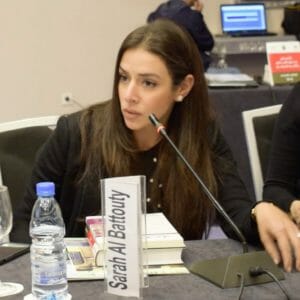
You must work beyond the conventional in order to shift paradigms.
Sarah El Battouty founder, ECOnsult, Egypt; 2020 WE Empower Awardee, Greater Middle East and North Africa
Sarah El Battouty, founder, ECOnsult, Egypt
2020 WE Empower Awardee, Greater Middle East and North Africa
Throughout Sarah El Battouty’s early career, she viewed the hurdles that she faced not as challenges, but rather as opportunities for growth. As founder of ECOnsult, she has built Egypt’s leading environmental design and architectural consultancy business that works to localize the architecture process, ultimately supporting the health and wellbeing of communities by creating jobs, promoting responsible production and consumption habits, and reducing harmful climate impacts through renewable energy and sustainable resource management. While pioneering sustainability efforts, ECOnsult also champions gender equality as a woman-owned company with 50% female staff in a male-dominated sector. WE Empower intern, Jessie Kaull, interviewed Sarah El Battouty and expands on her company’s support of the UN SDGs.
ECOnsult is Egypt’s leading green building and sustainability consultancy that enables companies to have positive economic, social and environmental impacts on their communities. Early in El Battouty’s career, she began exploring ways her company could showcase innovative technologies and locally-sourced materials through the development of Smart Buildings, and she encouraged businesses to leverage these changes as a key competitive advantage. By designing for and with the people who live and work in these buildings, ECOnsult also emphasizes the importance of the process rather than simply the end-product.
Shifting mindsets
Prior to ECOnsult’s launch in 2013, environmentally-conscious mindsets were not mainstream within architectural practices. For example, environmental impact assessments were only required for large multinational companies, excluding a large proportion of other businesses. In 2014, economic reforms in Egypt led to the removal of energy subsidies. As El Battouty notes, “suddenly this commodity had a price, and people began searching for alternatives.” Mindsets began shifting to recognize the value of building sustainably for the future. ECOnsult was at the forefront of this paradigm shift, becoming the first registered environmental design company in Egypt. By breaking free from pre-existing expectations within the industry and putting sustainability at the forefront of their mission, they effectively redefined the values of contemporary architecture to encompass resiliency and accessibility.
The foundation for a sustainable future
With “sustainability ingrained in [ECOnsult’s] DNA”, their work aligns directly with SDG 11: Sustainable Cities and Communities. The company is committed to evaluating the holistic model of a project, considering the many ways in which the building will interact with the surrounding people and place. With the guiding mission of making green buildings that save energy, water and materials as affordable and accessible as possible, the company works hard to address the needs of their clients as well as the broader community. ECOnsult further strengthens communities’ resiliency by creating a network of localized partnerships that collectively contribute to sustainably-conscious actions. Whether it be partnering with hydroponic, recycling, solar, or used-cooking oil collection companies, ECOnsult supports other “eco-solution” companies in order to promote the development of sustainable cities and communities more broadly.
SDG 9: Industry, Innovation and Infrastructure is also central to ECOnsult’s mission, as they work to build resilient infrastructure, promote sustainable industrialization and foster innovation through their projects. By choosing local building materials, localizing labor from skilled artisans and drawing upon traditional knowledge as much as possible, ECOnsult re-constructs the construction value chain in Egypt and beyond. Rather than using harmful chemicals, native herb species, such as chamomile, are used as natural pest repellents. Utilizing traditional construction methods facilitates building in a more energy efficient manner rather than importing energy-intensive building materials. As El Battouty points out, “there is a huge wealth of indigenous knowledge… that would otherwise be lost through time. Should you take it back to the industry, that is where the innovation happens.”
Since its inception, ECOnsult recognized that climate change challenges were undeniably, and increasingly, at the center of every architectural project. Working in the second most energy intensive sector in Egypt, ECOnsult has the ability to directly address SDG 13: Climate Action. ECOnsult builds accountability into the earliest stage of their business model in order to reduce the industry’s high climate impact. They use up to 70% recycled materials in their interior designs, complete energy audits and modeling, meet LEED, BREEAM, EDGE, Tarsheed and World Green Building Council certifications, offer sustainability training and provide green corporate manuals. Mindful that market demand continues to grow in tandem with the occurrence of harmful climate events, ECOnsult is committed to leading the way as a responsible global citizen by striving to maximize sustainable innovation while minimizing harmful environmental impact.
Encouragement to women
ECOnsult actively challenges ways the design and construction sectors currently address climate action and women’s empowerment. After years of trailblazing in an industry where female leadership has historically been viewed as unconventional, El Battouty encourages fellow women entrepreneurs to act with intention and “know the nature of their vision.”
While pursuing their own careers, she urges women to “learn to wear many hats” as thinkers, teachers, creative problem solvers, managers and advocates, and to always lead with unwavering commitment to their values.

